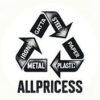Tax strategies are essential for optimizing the financial health of a metal scrap import business. Implementing effective tax planning can significantly reduce liabilities and enhance profitability. Here are key strategies to consider:
1. Understanding Applicable Tax Regulations
First, ensure comprehensive knowledge of both domestic and international tax regulations affecting metal scrap imports. This includes customs duties, import tariffs, and value-added tax (VAT). Staying updated on changes in tax laws can prevent costly penalties and take advantage of potential tax benefits.
2. Leveraging Tax Incentives and Credits
Many countries offer tax incentives for businesses involved in recycling and sustainability initiatives. These can include credits for investing in environmentally friendly technologies or deductions for energy-efficient practices. Researching and applying for these incentives can lead to substantial tax savings.
3. Efficient Inventory Management
Adopt an effective inventory management system to accurately track the cost and volume of imported scrap metal. This precision helps in calculating the cost of goods sold (COGS), which directly affects taxable income. Optimizing inventory turnover can also reduce storage costs and enhance cash flow.
4. Strategic Use of Depreciation
Invest in durable processing and recycling equipment and use accelerated depreciation methods. This allows for larger deductions in the initial years, reducing taxable income significantly. Section 179 and bonus depreciation are options that can provide immediate tax relief for new equipment purchases.
5. Tax-Efficient Business Structure
Choose the right business structure—such as an LLC, S-Corp, or C-Corp—to maximize tax benefits. Each structure has different implications for how income is taxed and can influence overall tax liability. Consulting with a tax advisor to select the most advantageous structure is crucial.
6. International Tax Planning
For businesses involved in cross-border trade, understanding double taxation treaties and transfer pricing regulations is vital. These agreements can help avoid being taxed twice on the same income and ensure compliance with international tax standards.
7. Regular Tax Audits and Compliance Checks
Conduct regular internal audits and compliance checks to ensure all tax filings are accurate and timely. This proactive approach can prevent audits and penalties from tax authorities.
Implementing these strategies requires continuous monitoring and adjustment in response to regulatory changes and metal scrap import business growth. Consulting with a tax professional specialized in the metal scrap import business can further enhance tax efficiency and ensure compliance with all relevant laws.

